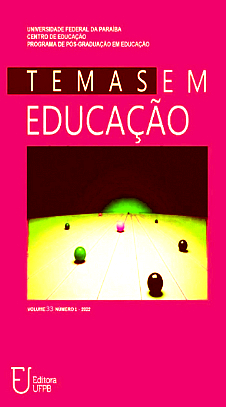60 ANOS DO GOLPE MILITAR
a educação brasileira entre mudanças e permanências
DOI:
https://doi.org/10.22478/ufpb.2359-7003.2024v33n1.70813Keywords:
Military dictatorship in Brazil; Democratic Resistance; Educational reforms.Abstract
In March 2024, Brazil celebrated the 60th anniversary of the coup d'état that instituted the military dictatorship (1964-1985). His policy on education was contradictory: on the one hand, he controlled the school apparatus at all levels; on the other, it expanded the system. Today, we are living in the future of the 60th anniversary of the military coup and the almost 40th anniversary of the conquest of democracy (1985) and we can better understand them as the events that provoked the dictatorship bear fruit. That's because, as long as the present unfolds, there is no certainty about which of its probabilities will become future. History is a set of possibilities and not a prior certainty. With this theoretical perspective, this study is based on primary and secondary sources, documents and music of the time, as well as on the authors' experience against the military dictatorship. It presents the reasons for the 1964 coup d'état; The educational policy of the military dictatorship and its developments in the almost four decades following). It shows that the country has advanced in the expansion of higher education and in the strengthening of research in contrast to the serious and persistent problems in the public basic school system. The conclusions about these 60 years are inspired by Fernand Braudel's theory of changes and continuities that characterize the entire historical process of humanity.
Downloads
References
COVRE, Maria de Lourdes. A fala dos homens. São Paulo, 1981.
IANNI, Octávio. Estado e planejamento econômico no Brasil 1930-1970. 3ª ed. Rio de Janeiro: Editora Civilização Brasileira 1979.
FREIRE, Paulo. Educação como prática da liberdade. 8ª ed. Rio de Janeiro: Editora Paz e Terra, 1978.
FERNANDES, A revolução burguesa no Brasil: ensaio de interpretação sociológica. 3. ed. Rio de Janeiro: Zahar Editores, 1981.
COUTO e SILVA, Golbery. Geopolítica do Brasil. São Paulo. José Olympio, 1967.
OS comunistas saem das sombras. Campo Grande. Jornal da Cidade, 19 a 25 de maio, 1985. p. 6.
PASSARINHO, Jarbas. Reescrevendo a História. O Estado de S. Paulo, São Paulo, 02 dez. 1997. Caderno A,
PASSARINHO, Jarbas. Pode a História ser apagada? O Estado de S. Paulo, São Paulo, 08 abr. 2003. Caderno A.
PASSARINHO, Jarbas. A batalha perdida. O Estado de S. Paulo, São Paulo, 06 abr. 1999. Caderno A,
PASSARINHO, Jarbas. A educação como prioridade nacional. O Estado de S. Paulo, São Paulo, 12 mar. 1996. Caderno A.
PAIVA, Vanilda. Educação popular e educação de adultos. 4. ed. São Paulo: Loyola, 1987.
ROMANELLI, Otaíza. História da Educação no Brasil. Petrópolis, 1986.
SCHAFF, Adam. História e verdade. 4ͣ ed. Tradução Maria Paula Duarte. São Paulo: Martins Fontes, 1987.
SILVA, Marina. Facebook. 21 junho, 2018.
VANDRÉ, Geraldo. Prá não dizer que não falei das flores. 1967.
VANDRÉ, Geraldo e BARROS, Théo de. Disparada. 1966.
VELOSO, Caetano. É proibido proibir, 1968.
Downloads
Published
How to Cite
Issue
Section
License
Copyright (c) 2024 Revista Temas em Educação

This work is licensed under a Creative Commons Attribution 4.0 International License.
Authors who publish in this journal agree to the following terms:
. Authors retain the copyright and grant the journal the right to first publication, with the work simultaneously licensed under the Licença Creative Commons Attribution that allows the sharing of the work with acknowledgment of authorship and initial publication in this magazine. . Authors are authorized to assume additional contracts separately, for non-exclusive distribution of the version of the work published in this journal (eg, publishing in institutional repository or as a book chapter), with acknowledgment of authorship and initial publication in this journal.
. Authors are permitted and encouraged to publish and distribute their work online (eg in institutional repositories or on their personal page) at any point before or during the editorial process, as this can generate productive changes, as well as increase impact and citation of the published work (See O Efeito do Acesso Livre).



















